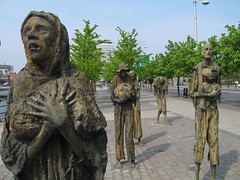Famine Memorial
Took some time to take in the Famine Memorial site down the street from the Customs House over the weekend. Incredibly moving memorial. It captures the despair and sorrow of that dark time in Irish history well.
While many historical interpretations and analyses have been offered over the years, here are a few general facts:
"[The Famine] established bitterness and deep resentment towards Britain, which has also had long-standing consequences." (p. 59)
"This overwhelmingly agricultural economy led to three important preconditions which made the Famine worse when it came: overpopulation, poverty and dependence on the potato as the main crop and food source." (p. 60)
". . . perhaps most significantly, the Famine placed the possibility of emigration permanently in the Irish rural mind." (p. 72)
While many historical interpretations and analyses have been offered over the years, here are a few general facts:
- took place from 1845-52
- roughly 1 million people perished from starvation and disease
- a further 1 million people emigrated
- famine due in part to a potato blight caused by a fungus, and lead to massive crop failure
- While most of the voluntary relief came from Britain (via the Quakers), historians also note that the British government (Ireland was a part of the UK at the time) demonstrated gross negligence in it's relief efforts. (Okay, maybe this point is moving away from the "general facts" side of things to "interpretation.")
- The potato blight returned in 1860, 1879, 1890, and 1897 with further starvation and disease, though far less severe than the first famine.
"[The Famine] established bitterness and deep resentment towards Britain, which has also had long-standing consequences." (p. 59)
"This overwhelmingly agricultural economy led to three important preconditions which made the Famine worse when it came: overpopulation, poverty and dependence on the potato as the main crop and food source." (p. 60)
". . . perhaps most significantly, the Famine placed the possibility of emigration permanently in the Irish rural mind." (p. 72)


No comments:
Post a Comment